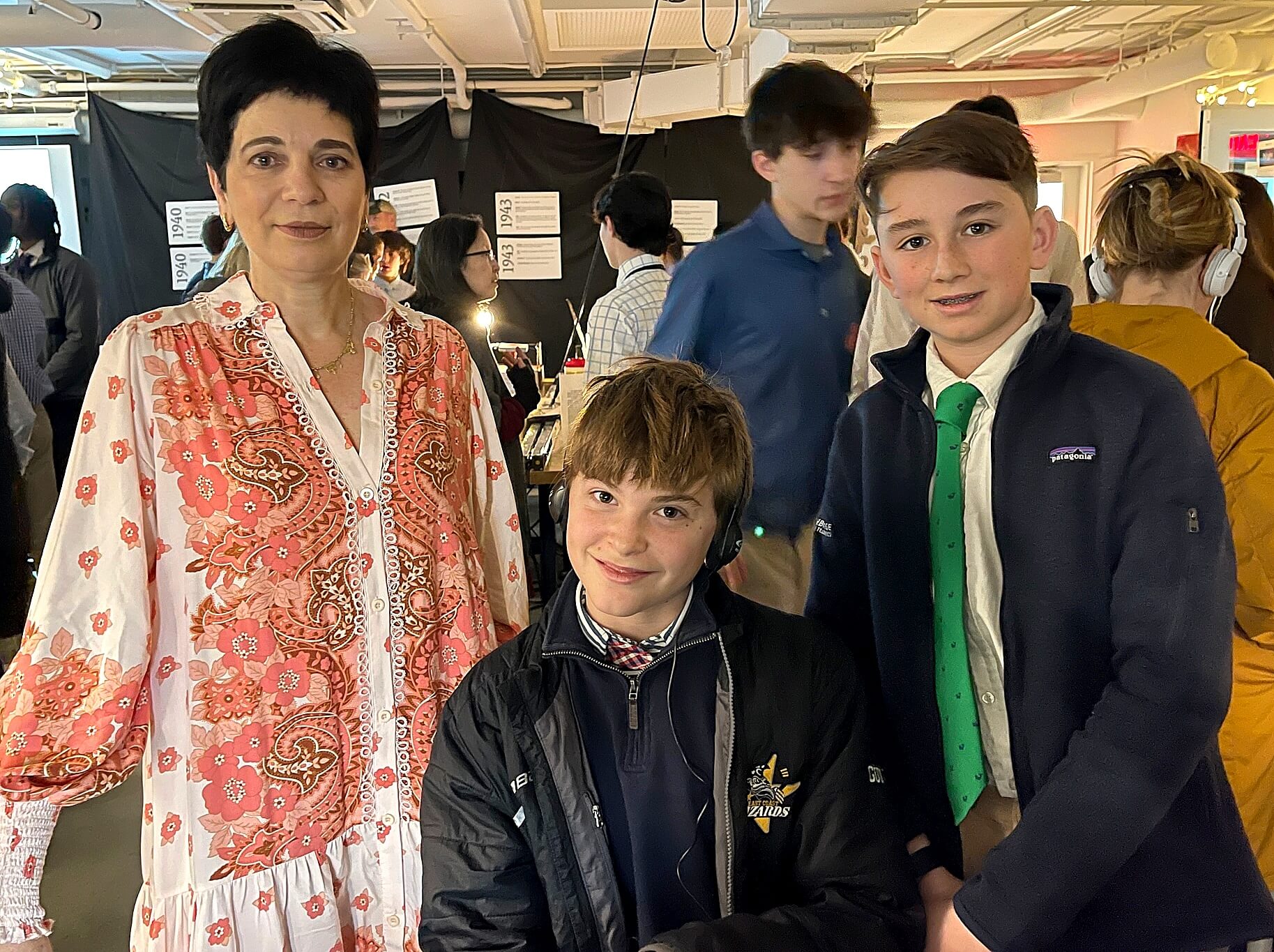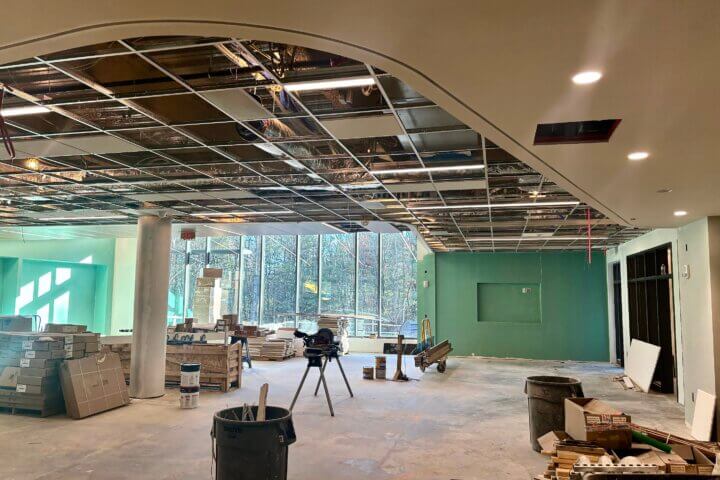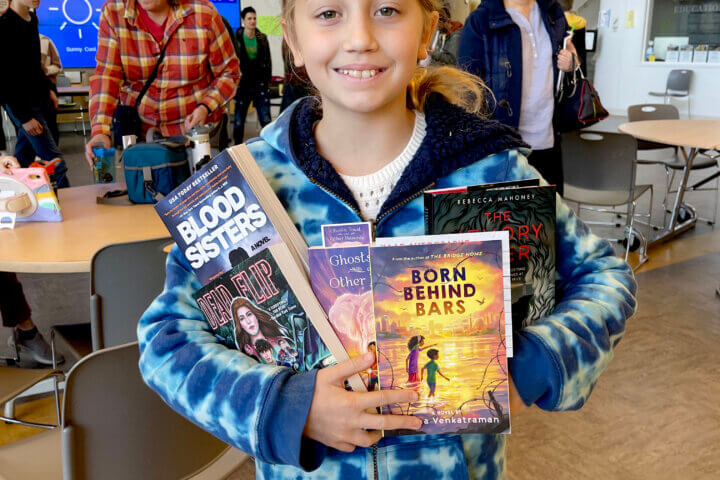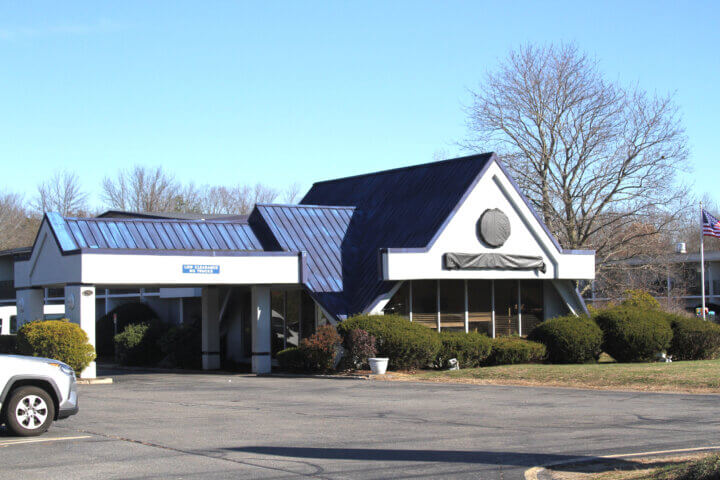“My Holocaust story defines me, and like all survivor stories it needs to be told.”
That’s how Isaac Jack Trompetter, a Cambridge artist, explained to Fenn School eighth-graders why he was sharing the harrowing account of his journey into and out of hiding before and during World War II and how the traumatic experience affected him and his parents.
Trompetter, 80, was born in Amsterdam as European anti-Jewish sentiment was building. He was sent away as an infant for nearly three years for his protection. Trompetter’s presentation on March 8 preceded the opening of a one-day student Holocaust exhibit titled “Preserving Memory,” which hosted Trompetter and descendants of other Holocaust survivors.
In Fenn’s Stone Family Innovation Lab, with the windows shrouded in black cloth, visitors made their way from exhibit to exhibit, examining the artifacts that students had created using a variety of materials, symbolism, and colors. One display representing Liberation Stories included clay birds escaping from a barbed wire encircled cage. The boys talked about their projects and provided iPads for guests to view documentary videos.
In a unique collaborative effort that included the Concord Museum and the organization Facing History and Ourselves, which offers resources and guidance to teachers who wish to engage their students in making the connection between history and the contemporary moral choices they face, eighth-graders developed exhibits on places and events ranging from Auschwitz to Kristallnacht.
Jonas Ahlgren, who with three other boys created a display about the Death Marches, called the effort “an emotional experience. I learned that there were more horrors than I had previously known about,” he said. Teammate Toby Cleary agreed, saying, “You didn’t have to be in a camp to have had a horrible life.” Seth Drabik, whose team project was called Hiding Jews, said he was struck “by the risks people took and the courage they had to help others.”
Assisting with the exhibit were the chairs of the Fenn history and English department, Matt Ward and Jill MacKinnon, respectively; members of the eighth grade Humanities team; Nathan Kraali, director of the Innovation Lab and Design Thinking; and the Library and Media Literacy staff.
“I believe it is the collaboration that made it a success,” said MacKinnon of the endeavor. “Project based learning requires a team approach, and teachers can model that for students, conveying that what we are doing is important and that learning doesn’t happen in isolation.” Ward said that “creating a product for an authentic audience that included a survivor and descendants raised the bar for the boys, adding motivation and seriousness of purpose to the project.”
Representatives of Facing History, including Jeff Smith of Newton and Karen Kirsten, an area survivor descendant, writer and genocide educator, attended the exhibit. Kirsten is the author of the forthcoming memoir “Irena’s Gift,” which was inspired by her search for her mother’s rescuers in Nazi-occupied Poland.
Susan Foster Jones, director of Education at the Concord Museum, and Jenny Gratz, director of School Programs and Family Learning, had talked to the boys about how to set up an exhibit. They suggested that students create a “reflection room” where guests could quietly share their feelings about what they saw. “They ran with [the project so wonderfully and took it very seriously,” Gratz said. Added Jones, “We’re very proud of what they did.”
Trompetter, in his remarks to the class earlier that day, held his audience rapt as he described his family’s ordeal, saying that “it was a terrible choice for my mother to make but she was brave enough to send me away.” After spending time in an orphanage, Trompetter was sent to a Christian family on a farm in rural Holland for nearly three years. Reuniting with his parents was traumatic; he thought of the farmers as his family and regarded his mother and father as strangers.
Trompetter’s grandparents and other relatives had been killed by Nazis. That his parents had survived was a source of some guilt for them, “but they could and did save their child,” said Trompetter. Even after liberation, his parents didn’t feel safe in Holland and the family came to America in 1949, settling in Far Rockaway, New York.
His voice breaking, Trompetter said that he had been through “the kind of trauma that takes decades to deal with and be able to talk about.” He is glad, though, that his mother told him the details of the story when he was a teenager. When asked by a student how he feels now about what the family endured, Trompetter replied, “I’m an optimist. My life has been good because I am here, and I was so close to not being here.”
Trompetter is part of a group of New England Holocaust survivors that regularly meets over Zoom. “When the last survivor is gone, what will happen?” he asked. “We don’t want our story to be reduced to a page in a history book, or worse, forgotten.” He had a message for his audience: “Never forget that when you make people into ‘others,’ you’re headed for trouble.”






